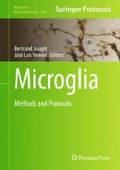Abstract
Microglia are an important component of the innate immune system within the central nervous system (CNS). Isolation and in vitro culturing of microglia can provide insight towards the basic biology of these cells as well as their interactions with neurons, astrocytes, and oligodendrocytes. While studies of rodent microglia and microglial cell lines have provided a basis for our understanding of these cells, human adult microglia exhibit distinct properties when compared to rodent cells. Furthermore, the study of human fetal microglia provides a window into the developing CNS. This chapter describes the protocols used to isolate, purify, and culture both human adult and fetal microglia. Under basal culture conditions, human microglia survive for extended periods in the absence of growth factors, thus allowing their properties to be investigated under resting conditions. In addition, both human adult and fetal microglia can be used to study how they respond to different polarization conditions. As is the case with macrophages, it is also possible to polarize microglia towards the pro-inflammatory “M1” and the anti-inflammatory “M2” phenotypes, as described in this chapter.
Access this chapter
Tax calculation will be finalised at checkout
Purchases are for personal use only
References
Durafourt BA, Moore CS, Zammit DA et al (2012) Comparison of polarization properties of human adult microglia and blood-derived macrophages. Glia 60(5):717–727
Ruffini F, Arbour N, Blain M et al (2004) Distinctive properties of human adult brain-derived myelin progenitor cells. Am J Pathol 165(6):2167–2175
Cui QL, Fragoso G, Miron VE et al (2010) Response of human oligodendrocyte progenitors to growth factors and axon signals. J Neuropathol Exp Neurol 69(9):930–944
Darlington PJ, Goldman JS, Cui QL et al (2008) Widespread immunoreactivity for neuronal nuclei in cultured human and rodent astrocytes. J Neurochem 104(5):1201–1209
D’Souza S, Alinauskas K, McCrea E et al (1995) Differential susceptibility of human CNS-derived cell populations to TNF-dependent and independent immune-mediated injury. J Neurosci 15(11):7293–7300
Author information
Authors and Affiliations
Editor information
Editors and Affiliations
Rights and permissions
Copyright information
© 2013 Springer Science+Business Media New York
About this protocol
Cite this protocol
Durafourt, B.A., Moore, C.S., Blain, M., Antel, J.P. (2013). Isolating, Culturing, and Polarizing Primary Human Adult and Fetal Microglia. In: Joseph, B., Venero, J. (eds) Microglia. Methods in Molecular Biology, vol 1041. Humana Press, Totowa, NJ. https://doi.org/10.1007/978-1-62703-520-0_19
Download citation
DOI: https://doi.org/10.1007/978-1-62703-520-0_19
Published:
Publisher Name: Humana Press, Totowa, NJ
Print ISBN: 978-1-62703-519-4
Online ISBN: 978-1-62703-520-0
eBook Packages: Springer Protocols

